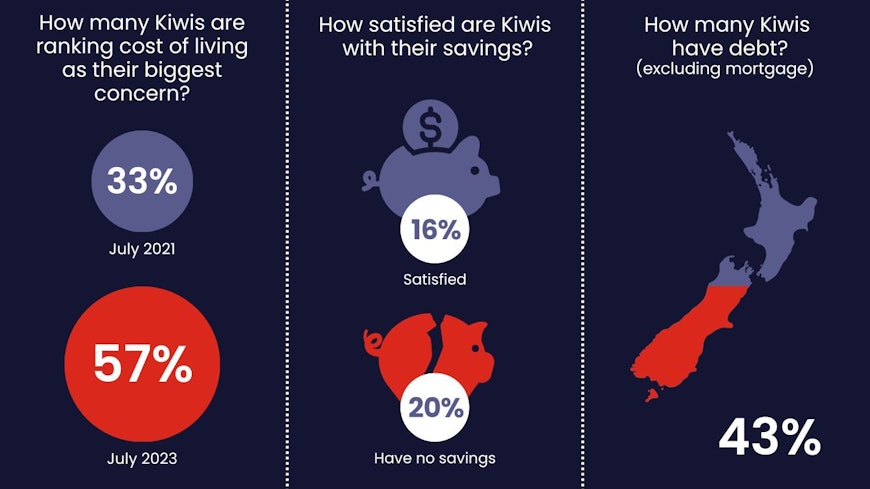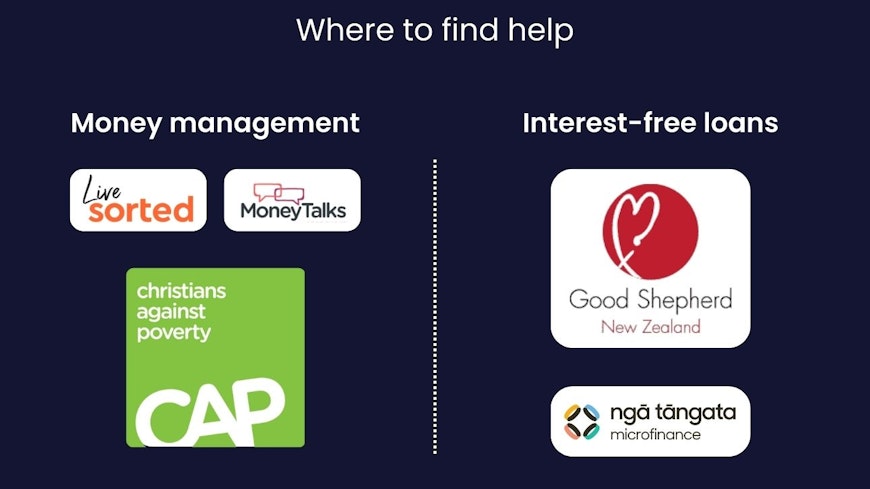Kalasia’s* journey with unmanageable debt started when she and her husband were struggling sharing one car. It was hard enough getting them both to work on time, let alone also taking care of four kids and their busy schedules.
On top of a personal loan they already had, they applied for a car loan.
This is when their already tight finances got even tighter.
“I couldn't manage everything so well,” Kalasia told Consumer. “With my car loan coming out, personal loan ... rent, everything else, and you know you have insurances and all of that ... I was falling behind on some payments and falling into arrears because [if] I pay my loan [then] I lose money for groceries.”
Kalasia isn’t the only one struggling.
Across Aotearoa people are feeling the brunt of the high cost-of-living. Our latest Sentiment Tracker surveyed it as the biggest stressor for consumers.
In the face of this crisis, 56% of New Zealanders surveyed said they are unable to save more than 5% of their income. This is worse for people on lower incomes. Financial management organisations we’ve approached report there are more people struggling to make ends meet, and in their desperation some are applying for loans to secure the essentials.
However, these loans often become unmanageable which can make budgets even tighter and make it harder to survive, let alone live.

High need for financial support
Consumer reached out to different financial management and mentoring organisations across Aotearoa to learn more about how they support New Zealanders in debt.
Across the board they reported an increase in need and associated this increase with the cost-of-living crisis.
We spoke to Natalie Vincent, head of microfinance at Good Shepherd, a charitable, independent organisation that helps those struggling financially and offers interest-free loans. She reported they’re receiving around 300 enquiries over a weekend.
“We have an unsustainable number of inquiries with the size of the team we have,” she said.
Bay Financial Mentors’ (BFM) general manager Shirley, reported an increase in need as well. She said not only are most of their clients struggling with debt, but the amount of debt continues to grow.
Some of their clients with debt struggle to manage their finances, while others are simply surviving on so little that borrowing appears the only option for them.
“People are struggling with the cost-of-living, and stress levels are high,” Shirley told Consumer. “Our priority is always food, shelter and electricity, but even these are at risk for many clients. They often find there is nothing left for food at the end of the week and turn to foodbanks.”
The fear of not having the money to support her family led Kalasia to look for support. It didn’t take long before she came across Good Shepherd. In February, through Good Shepherd, Kalasia was able to consolidate her loans into one fortnightly interest-free payment. It took a while, but she said it was absolutely worth it.
"Instead of having $300 go this way, and $200 go here, and $50 here, $20 there, I’ve only got one payment of $192 a fortnight,” Kalasia told Consumer. “I’m happy to say that my credit report, now, has gone from red to orange.”
Kalasia stresses the value of committing to making the changes. Good Shepherd helped with this, as part of their process is keeping the client accountable to a budget.
“I believe you truly have to be consistent ... I was so passionate, like I’m on this journey now and I want to get myself out of this and change my lifestyle,” Kalasia said. “It’s not an overnight thing, and it’s not a week, it won’t happen under a month, it’s a journey you have to take.”

Being one change away from debt
Julie was renting from friends in Auckland with her husband when their second child came along. They were paying under-market rent from a friend, but when the property had to be sold Julie’s family had to look elsewhere.
“At the same time my hours at work got cut. So, I was at home with the little one, wasn't working as many hours as I used to, and our rent went up $180-200 a week ... that was the start of the downfall,” Julie shared with Consumer.
Julie and her husband needed money and felt there wasn’t any option other than to borrow. Even when Julie started working more, they still struggled because their debts had grown too large to manage.
“There was a little bit of, you know, living outside our means, going to a friend’s party when we shouldn’t have, that sort of stuff,” Julie said. “We had a close family wedding in Rotorua, we couldn’t not go, but we didn’t have the money for it, so we borrowed.”
It was clear Julie felt unsure about these spending choices, however, being involved in social events is important for mental wellbeing and shouldn’t need to be considered as unreasonable or unnecessary spending.
Through family they were connected with Christians Against Poverty.
Julie felt a lot of angst about making that first phone call.
“I kind of put it on the back burner for probably another six months before I actually made the call... it was hugely emotional, like bawling my eyes out talking to someone I’ve never met and divulging all of our details, but they were nothing short of amazing.”
Julie got the support she needed, but paying off the debt was an uphill battle. For the following three years Julie and her family were put on a tight budget they had to stick to. For a family of four in 2019, the weekly grocery budget was $220, entertainment was $10, and more – it was a big adjustment.
The budget meant they had to cut a lot out, including their kids’ extra curriculars like sports and swimming.
Now, three years later, they’re debt-free and saving for their first family holiday. Not only this, but their kids have joined taekwondo and gymnastics.

The mental and the financial
Stress over the cost-of-living crisis, as well as general personal finances is not only creating financial harm, but mental harm.
Both Natalie and Shirley also noted the mental harm which accompanies financial harm, especially unmanageable debt.
“Living in financial hardship takes a phenomenal toll on a person’s wellbeing,” Shirley said. “It impacts their mental, physical and spiritual wellbeing. It impacts their children’s wellbeing and creates stress and conflict in the home.”
There are numerous studies which demonstrate how struggling with unmanageable debt is a strong predictor of depression and anxiety. Not only this, but people suffering from mental health issues are likely to find it harder to make debt repayments, meaning debt can become even more unmanageable. It becomes a vicious cycle.
Julie said living for three years on such a tight budget was hard and she doesn’t know how people can do it without support from whānau and friends.
This was something Kalasia struggled with. She chose not to confide in her family, afraid of what they may think.
"Sharing it with my work colleagues was much easier because they didn’t know me, they don’t know where I come from, my background, my history,” she told Consumer. She said she could share as much as she was comfortable with because of those differences, and only got positive support.
Shame or anxiety about being judged is a common feeling for people who are experiencing financial hardship. It’s often why people wait until they’re at their absolute limit to reach out for help.
Finding support
There is support available across New Zealand, but it can be hard to know who to turn to, let alone how to ask for help. Bay Financial Mentors (BFM) told Consumer that this is all too common.
General manager Shirley said their financial mentors are like coaches, they don’t tell you what to do but work alongside you to give support. It helps to know there is someone who can help navigate a way forward, Shirley told Consumer.
Natalie Vincent said that Good Shepherd works collaboratively with other debt solution providers and financial mentors to ensure that “every door is the right door” to connect people with the support they need. People only need to reach out.
Before Kalasia decided to apply for loans, she sought out support from Work and Income. She told us that because she earnt over the income threshold by $14, she wasn’t eligible for any payments.
“[Work and Income] see you’re in debt, and you are in hardship, yet they never refer you on to anything, and I feel like that’s crazy,” Kalasia said. “It wasn’t until I engaged with Good Shepherd that I actually found that there are other organisations ... and I’d never ever heard about them."
Kalasia is grateful she checked online for other options to find Good Shepherd, or she would be stuck with a consolidated bank loan with huge interest fees, simply because she was so desperate.
Work and Income is an organisation within the Ministry of Social Development, which contributes towards the operating costs of Good Shepherd to support people on limited incomes to access affordable loans.

What needs to change
“I consider myself low income, but others say it’s quite a good income,” Kalasia said. “But even with me being on that ‘good income’ it’s not enough, especially balancing four children.”
While Kalasia’s debts are settled now, and she only has the one payment to make to Good Shepherd, it’s still hard.
"[At the] beginning of the year, my rent increased by $100 [a week]" Kalasia told Consumer. “It’s freaky for me to even think that if I was in the position I was in last year, with an increase of rent and everything that’s happening now, I would be homeless.”
Kalasia loves her job, it works for her and her family, but she’s been considering getting higher-paid work to feel more financially secure.
“Ultimately, people need more money,” Natalie told Consumer. “It costs a lot to live now, and incomes are not enough.”
“People want to actually take care of their own families, they want to buy their own food, they don't want to go to a foodbank, they want to pay the utility bills on time, people don't want to be stuck in traps of unmanageable debt.”
But Natalie says that without increases in wages and support benefits this is the reality.
“It's really at a heightened level at the moment, which is extremely worrying. We've got more and more people in poverty, more than we've ever seen.”
*Name has been changed to protect privacy
Public Interest Journalism funded through NZ On Air

Do landlords have to provide heating?
We outline your landlords responsibilities and obligations under the Residential Tenancies Act.



